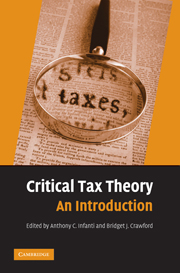Book contents
- Frontmatter
- Contents
- List of Illustrations
- List of Tables
- List of Contributors
- List of Common Abbreviations
- Introduction
- CHAPTER 1 FOUNDATIONS OF CRITICAL TAX THEORY
- CHAPTER 2 HISTORICAL PERSPECTIVES ON TAXATION
- CHAPTER 3 THE GOALS OF TAX POLICY
- CHAPTER 4 CRITICAL TAX THEORY MEETS PRACTICE
- CHAPTER 5 RACE AND TAXATION
- CHAPTER 6 GENDER AND TAXATION
- CHAPTER 7 SEXUAL ORIENTATION AND TAXATION
- CHAPTER 8 THE FAMILY AND TAXATION
- CHAPTER 9 CLASS AND TAXATION
- CHAPTER 10 DISABILITY AND TAXATION
- Tax and Disability: Ability to Pay and the Taxation of Difference
- Enabling Work for People with Disabilities: A Post-Integrationist Revision of Underutilized Tax Incentives
- Disability and the Income Tax
- CHAPTER 11 GLOBAL CRITICAL PERSPECTIVES ON TAXATION
- CHAPTER 12 CRITICAL PERSPECTIVES ON CRITICAL TAX THEORY
- Index
Disability and the Income Tax
Published online by Cambridge University Press: 04 August 2010
- Frontmatter
- Contents
- List of Illustrations
- List of Tables
- List of Contributors
- List of Common Abbreviations
- Introduction
- CHAPTER 1 FOUNDATIONS OF CRITICAL TAX THEORY
- CHAPTER 2 HISTORICAL PERSPECTIVES ON TAXATION
- CHAPTER 3 THE GOALS OF TAX POLICY
- CHAPTER 4 CRITICAL TAX THEORY MEETS PRACTICE
- CHAPTER 5 RACE AND TAXATION
- CHAPTER 6 GENDER AND TAXATION
- CHAPTER 7 SEXUAL ORIENTATION AND TAXATION
- CHAPTER 8 THE FAMILY AND TAXATION
- CHAPTER 9 CLASS AND TAXATION
- CHAPTER 10 DISABILITY AND TAXATION
- Tax and Disability: Ability to Pay and the Taxation of Difference
- Enabling Work for People with Disabilities: A Post-Integrationist Revision of Underutilized Tax Incentives
- Disability and the Income Tax
- CHAPTER 11 GLOBAL CRITICAL PERSPECTIVES ON TAXATION
- CHAPTER 12 CRITICAL PERSPECTIVES ON CRITICAL TAX THEORY
- Index
Summary
In recent years, federal, provincial, and territorial governments have devoted increasing attention to the status of disabled Canadians, emphasizing the integration of disabled persons as equal citizens within the broader community through policies designed to promote equal access to generic programs and services, while simultaneously recognizing the need for specific measures to address the costs of disabilities, to facilitate participation by disabled persons in the paid labor force, and to provide income support for disabled persons who have difficulty supporting themselves.
With respect to persons with disabilities, the [Canadian] Income Tax Act [(ITA)] recognizes the costs of disabilities through credits for itemized medical expenses (“medical expense tax credit”) and for mental or physical impairment (“disability tax credit”). Other provisions recognize additional costs associated with the care of disabled relatives by providing credits for infirm dependents over the age of eighteen (“infirm dependents credit”), and for specified relatives living in an individual's home who are over the age of eighteen and dependent on the individual because of mental or physical infirmity (“caregiver credit”); additional provisions encourage private savings to support disabled persons through special tax rules for inter vivos trusts with disabled beneficiaries. Participation by disabled persons in the paid labor force is facilitated by exempting specified disability-related employment benefits from tax, by allowing individuals eligible for the disability tax credit to deduct the cost of attendant care provided to enable them to participate in the paid labor force, by compensating disabled individuals who participate in the paid labor force for lost subsidies for disability-related supports under provincial social assistance, and by permitting employers to claim an immediate deduction for prescribed disability-related modifications to buildings and prescribed disability-related equipment.
- Type
- Chapter
- Information
- Critical Tax TheoryAn Introduction, pp. 316 - 322Publisher: Cambridge University PressPrint publication year: 2009



